How Stalin ruined the army
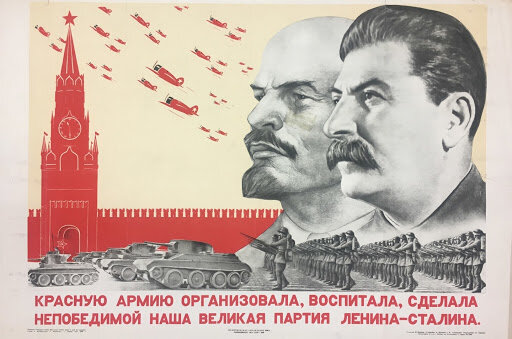
Most of the officers of the Red Army served in the tsarist army.
Traditionally, on the eve and after the celebration of Victory Day, the question is raised about the nature of this event, festive or mourning. On the one hand, there was a great victory over a strong enemy, on the other hand, there were terrible losses. And it is precisely the development of the idea of whether such huge losses could have been avoided that becomes the subject of controversy. They say that the country’s leadership was poorly prepared, missed the beginning of the war, and Stalin completely decapitated the army. That is, all these marches and celebrations fan the “patriotic frenzy” and push society to repeat mistakes. Of course, I have a rather negative attitude towards the personality of Stalin, but, as they say, justice is more expensive. And if the preparations for war were really not handled in the best way (which, in fact, is obvious from the first two years of the war), then the decapitation of the army is nonsense.
For starters, a quote from Wikipedia:
The repressions in the Red Army of 1937-1938 were large-scale political repressions (“purges”) against the command and control staff of the Red Army and the Russian Navy, which are singled out by researchers as one of the manifestations, an integral part of the policy of the “Great Terror” in the USSR, which, in turn, was a direct consequence of Stalin’s cult of personality. In fact, they began in the second half of 1936, but they became most widespread after the arrest and conviction of M. N. Tukhachevsky and seven other high-ranking military officers in May-June 1937; In 1937-1938 they peaked, and in 1939-1941, after a sharp decline, they continued with much less intensity. Repression took the form of politically motivated dismissals, arrests, and sentencing on trumped-up charges.
Following the new trends in political circles, competent officers, in particular Andriy Eremenko, began to talk about the decapitation of the army:
Comrade Stalin was significantly responsible for the extermination of military cadres before the war, which affected the combat capability of the army.
Or, for example, Alexander Gorbatov:
But I was sweating out my earlier fears: how would we fight if we had lost so many experienced commanders before the war? This, of course, was at least one of the main reasons for our failures.
It’s hard to argue with the people who forged the victory, but you have to. Let’s start, of course, with the numbers. For example, Nikolai Cherushev cites the following data: in 1937 there were 15,578 repressed, in 1938 8,612, and in 1939 357 (a total of 24,547 people). Oleg Souvenirov cites slightly larger figures: 28,685 people were repressed for political reasons for the entire period. It looks impressive and, indeed, It seems that literally all the officers have been arrested. But, of course, this is not the case. According to Yefim Shchadenko, 4,474 officers were arrested in 1937, and 206 of them were reinstated. In 1938, 5,032 people were arrested, 1,225 were reinstated, and in 1939, out of 73 arrested, 26 returned to service. In total, 8,122 officers were subjected to repression in three years. (RGVA. F.37837. Op.18. D.890. P.4-7.)At the same time, it should be borne in mind that the arrest is not necessarily politically motivated. The army has always been a privileged caste, which included the most diverse rabble. For example, in the year and a half from 2010 to the first half of 2011, 1,387 people were imprisoned in the North Caucasus Military District alone. No one wants to talk about repression in today’s army? But let’s go back to the pre-war years. Where do the numbers 24547 Cherushev and 28685 Souvenirov come from? A That’s where it came from.
40 thousand repressed
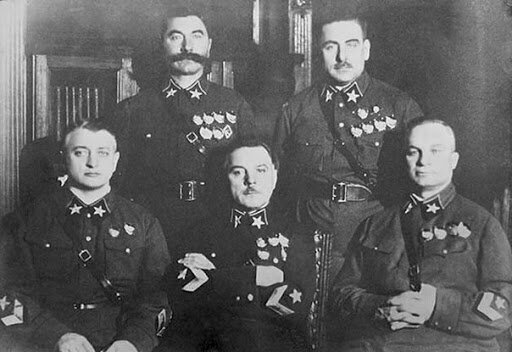
In the photo: Tukhachevsky, Budyonny, Voroshilov, Egorov, Blyukher
The “Great Purge” did not mean total repression, as it is perceived today. The vast majority of officers were simply dismissed. By the way, dismissals in the army always happen and this is normal. For example, in 1935, 6,198 officers were dismissed from the Red Army. This figure is not anomalous and no one was talking about a purge at the time. The maximum figure was in 1937. At that time, 18,658 people were discharged from the army, about three times more than usual. In 1938 there were 16,362 such officers. The numbers are quite impressive, and it was with them that Cherushev and Souvenirov played. At their own discretion, they determined who should be registered as repressed and who should not. By the way, people were discharged from the army due to death, disability, illness, drunkenness, and moral decay. In July 1938, foreigners, Poles, Germans, Latvians, Lithuanians, Finns, Estonians, Koreans, and others left the army, which, in my opinion, on the eve of the war (and few doubted that it would happen), was quite a logical decision. Taking into account those arrested (and thieves, murderers, and rapists were arrested) and reinstated, 11,034 officers were dismissed from the army for political reasons in 1937, 4,523 in 1938, and 205 in 1939. Although the numbers are still impressive, it is still worth looking at them from the point of view of the leadership of the time. Yes, in a normal state, a soldier should not be dismissed for political reasons, a soldier is obliged to love his country and follow orders, and whether he believes in the course of the government or not does not matter. However, even today, an officer who does not show loyalty to the country’s leadership is unlikely to sit in office. In short, the actions of the Stalinist government seem quite logical, although I personally do not approve of them. The question is, how did this affect the combat capability of the army?
Loss of combat capability of the Red Army
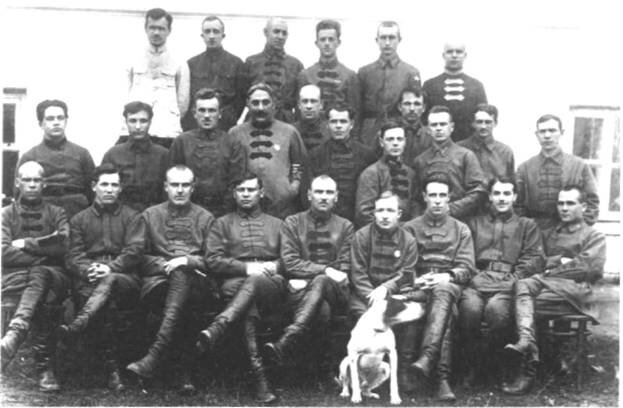
Soldiers of the Red Army before 1937
To begin with, let’s determine the share of those dismissed to the total number of managers. According to the same report of Yefim Shchadenko, in 1936-37 19,674 people were dismissed, or 6.9% of the list number (including 2,827 people of the political staff), and in 1938-39 11,723 people, or 2.3% of the list number (including 3,515 people of the political staff). Thus, about 4% of officers were dismissed from the army for political reasons in 1937 and about 0.15% in 1938. Against the background of the general shortage of officers (in 1937 there was a shortage of 34,000 commanders, and in 1938 39,000 commanders), the “repressions” alone could not cause significant damage to the combat capability of the army, and if we take into account the general overload of the Red Army with regular positions, then there can be no question of any loss of combat capability. The Red Army had the largest number of officers per private in the leading armies of the time. In 1939, there were 29 privates per officer in Germany, 22 in France, 15 in England, 19 in Japan, and 6 in the Red Army. And it’s not just about the political instructors (they also belonged to the commanding officers), but about the very structure of the Red Army. In an effort to increase the deployment rate, the peacetime army was overstaffed with officers. But maybe this 4% was just not enough?
History does not have a subjunctive mood, so it is impossible to assert that it was those who were subjected to repression who would have helped the Red Army to win in the border battle, just as it is impossible to assert the opposite. However, it should be taken into account that in the first two years of the war, the total losses of the Red Army servicemen amounted to a monstrous 6.4 million soldiers and officers. Thus, the losses of the command staff are significantly (dozens of times) higher than the number of those dismissed in the pre-war period. According to the logic of “undermining combat capability” due to repression, an army that had lost such a huge number of officers should have simply disintegrated. Moreover, in the first few months of the war. However, this did not happen. On the contrary, the combat capability of the Red Army only increased in the course of the war, and this despite the monstrous losses. Maybe, if not quantity, then quality? Maybe these “repressed” people had unique knowledge and were more valuable than hundreds of newcomers?
Ruined Talents
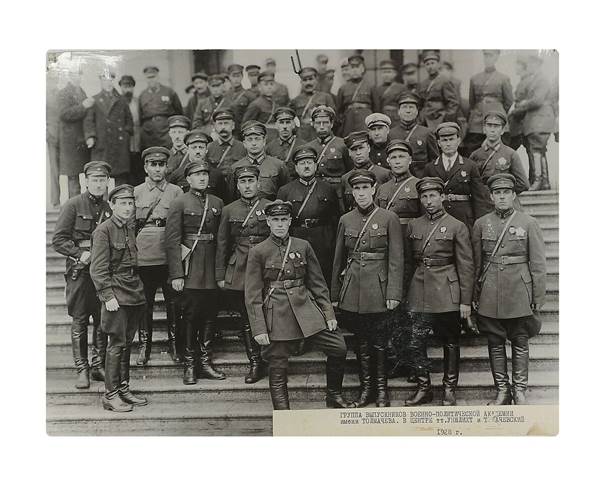
Graduates of the Military-Political Academy. Tukhachevsky is a little to the left in the center.
Strange as it may seem, in terms of education, the officers of the Red Army of 1941 looked much more profitable than in 1936. Strange as it may seem, during the period of “repressions” there was a steady increase in the number of officers with secondary and higher military education. Thus, in 1936 there were 13,000 officers in academic education, and in 1939, after the actual end of repressions, there were 23,000 officers. Military education in the volume of a military school had 125,000, 156,000 and 206,000 servicemen, respectively. In 1936, there were 71,000 commanders with secondary military education, and 2,700 with higher education, and by 1941 there were 127,000 and 6,500 respectively. At the same time, it is necessary to take into account the rapid increase in the size of the army, in which 4% of those repressed in 1937 would have been a drop in the ocean. Maybe combat experience?
Indeed, combat experience is of great importance, and the largest share of officers with such experience in the Red Army was immediately after the end of the Civil War. By 1923, the share of commanders with combat experience was 80%, by 1930 it had fallen to 60%, and in 1934 and 1938 it was only 23%. Does this mean that the repression did strike a blow? No. Even despite the large-scale deployment and significant growth of the army, by 1941 the share of commanders with combat experience in the Red Army was 29.5%. That is, it has grown, despite the repressions. How so? It’s that simple. In the 1930s, the USSR took part in a number of military conflicts, from Spain and Khalkhin Gol to the Finnish campaign. What then? Maybe it’s the fact that the repressions hit the top officers? Tukhachevsky, Gamarnik and others. Maybe they were military geniuses who would not have allowed the Germans to inflict crushing defeats on the Red Army in the initial period of the war?
Brilliant Generals
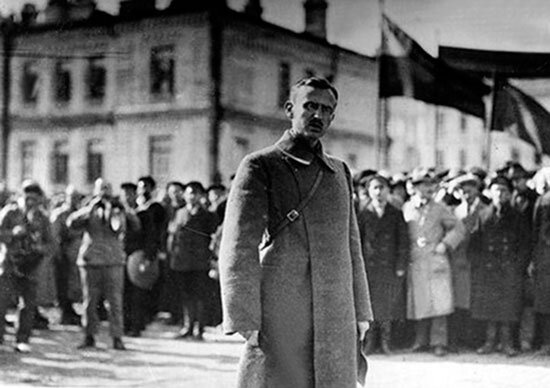
Hieronymus Uborevich, like some of his colleagues, did not have military talents and ended up in the leadership solely for political reasons.
The assertion that Uborevich, Tukhachevsky, Yakir and other commanders who came under attack during the “repressions” would have saved us from defeat is based solely on fantasies. There is no evidence that Uborevich had any special talents. On the contrary, there is every reason to believe that the “old” generals would have led to even more serious losses. Thus, an analysis of the maneuvers carried out in the autumn of 1936 in the Belorussian (commanded by Commander 1st Rank Hieronymus Uborevich) and Kiev (commanded by Commander 1st Rank Iona Yakir) military districts showed that during the exercises, the troops neglected reconnaissance and protection of the flanks, the attacking units operated in crowded combat formations, the commanders ineptly managed their units in battle, and there was no proper interaction between units of different types of troops.
But even greater losses in a real battle with the Germans would have been suffered by the infantry of Yakir and Uborevich. In the first place, it attacked the machine guns of the “enemy” everywhere not in rare chains, but in dense “crowds of squads… As for Uborevich’s infantry, they did not know how to conduct offensive close combat at all
A.Smirnov “Big Maneuvers” / “Rodina” No 4, 2000.
It should also be borne in mind that the arrested Gamarnik, Primakov, Tukhachevsky, Fedko, Yakir, all except Tukhachevsky, who fought for several months before his captivity, did not participate in the First World War. And Zhukov, Konev, Malinovskiy, Budyonny, Malinovskiy, Rokossovsky, Tolbukhin began it as ordinary soldiers. The first group rose to high office for ideological rather than military reasons, while the second group rose slowly due to their talents and skills. They gained real experience in managing an army, going from the bottom to the top of their military careers. As a result, the “brilliant military leaders” became such because they joined the Bolsheviks in time: Primakov in 1914, Gamarnik in 1916, Uborevich, Yakir, Fedko in 1917, Tukhachevsky in 1918. Another group joined the party after becoming military leaders: Konev in 1918, Zhukov, Rokossovsky in 1919, Malinovsky in 1926, Vasilevsky, Tolbukhin in 1938.

Marshals of Victory.
The question remains, if everything is so good, where did the 6.4 million losses in the first years of the war and the surrender of vast territories come from? There are many reasons for this, but the main one is that at that time the Wehrmacht was the strongest army in the world.
